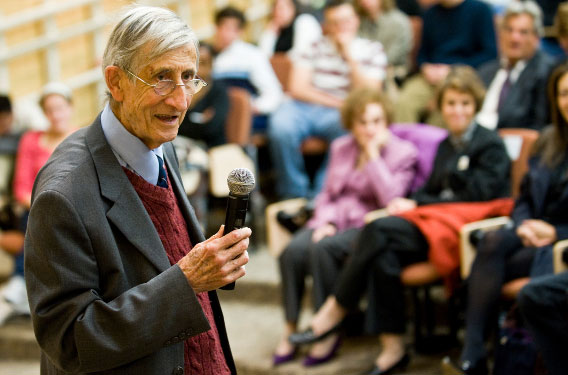Weapons and Hope
Physicist and author Freeman Dyson calls for nuclear disarmament and extols the future age of biotechnology
By Jacqueline Mitchell
While much of the world worries about nuclear bombs in the hands of rogue states, Freeman Dyson sees an equally large threat: the excessive reliance on those weapons by the United States.
“Nuclear weapons are useless for preventing wars or terrorist attacks, and are even more useless for winning wars,” said Dyson, a physicist and noted intellectual who delivered the 11th Richard E. Snyder President’s Lecture on October 1. He called for nuclear disarmament while also heralding the “domestication” of biotechnology in the talk, “Nukes and Genomes: Twin Genies Out of the Bottle.”

“Nuclear weapons are useless for preventing wars or terrorist attacks, and are even more useless for winning wars,” said Freeman Dyson at the Snyder President’s Lecture. Photo: Alonso Nichols
Dyson argued that it was not the August 1945 bombings of Hiroshima and Nagasaki but the Soviet invasion of Manchuria that convinced the Japanese to surrender at the end of World War II. “Like everyone else in England and the United States in 1945, I shared the belief that the bombs ended the war,” he said. “It will not be easy to persuade the American public that our brave soldiers and scientists did not win the war by themselves.”
He added that the United States’ stockpile of weapons is no deterrent against attacks by the so-called rogue states or terrorist groups that wish us harm. “The basic problem is that we have good military targets [for them to hit], while they have few,” Dyson said. “Or we can kill large numbers of people and make sure the survivors view us with enduring hatred.”
Citing President Richard Nixon’s 1969 executive order prohibiting biological weapons research, Dyson called upon U.S. military and political leadership to dismantle the nation’s nuclear arsenal with or without multilateral cooperation from our allies and foes. “We can never know for sure that our friends and enemies are not stockpiling weapons, but we would know for sure our weapons are gone,” he said. “That would make the world a lot safer, even if other countries keep theirs.”
Established in 2004 by Richard E. Snyder, A55, the lecture series is intended to “enrich intellectual life at Tufts by bringing to our campus prominent thinkers and scholars, shaded in the direction of people who succeeded through their willingness to challenge conventional wisdom,” noted President Lawrence S. Bacow in his introduction.
Dyson, 85, fits the bill. Professor emeritus of physics at the Institute for Advanced Study at Princeton University, Dyson was born in England and worked as a civilian scientist for the Royal Air Force during World War II. Throughout his diverse career working on nuclear reactors, astrophysics and biology, Dyson was attracted to any problem “where elegant mathematics could be usefully applied.” A prolific writer, he is the author of nine books about science for the lay audience and a frequent contributor to the New York Review of Books.
“There is no magic remedy that can make the world safe,” said Dyson. “A more open world is a safer world. Openness rather than secrecy is our best defense.”
The Coming Biotech Era
After calling for the end of the nuclear age, Dyson sketched his optimistic vision for the approaching age of biotechnology, comparing the evolution of that field to that of computer science. Just 50 or 60 years ago, computers were hulking behemoths limited to high-tech laboratories. Now 13-year-olds can develop applications for the iPhone. Dyson expects biotechnology to follow the same trajectory.
“Once a new generation of children grows up as comfortable with open-source biology as our children are with computers, the magic of genes will be available to anyone with the skill and imagination to use it,” he said.
One possible result Dyson envisions: new breeds of plants with silicon-based solar cells, capable of converting sunlight to energy with startling efficiency. Such organisms could increase the world’s food supply without using up more land or water.
Of course, these crops of the future would create a whole new set of questions, Dyson acknowledged. “Who will be allowed to grow them? Will they invade and permanently change the natural ecology? What to do with the silicon trash these plants would leave behind? But the 21st century will bring powerful new tools with which to solve these problems,” he said.
Dyson did not escape the evening without a question from the audience about his controversial views regarding global warming. While he does not dispute the scientific consensus that humanity’s fossil fuel use contributes to climate change, Dyson believes the danger of global warming has been “grossly exaggerated . . . and distracts us from other things which are more serious and that we can do something about right now,” citing homelessness, a lack of access to health care and social inequality as higher priorities.
Watch a video of the Freeman Dyson lecture.
Jacqueline Mitchell can be reached at jacqueline.mitchell@tufts.edu.

